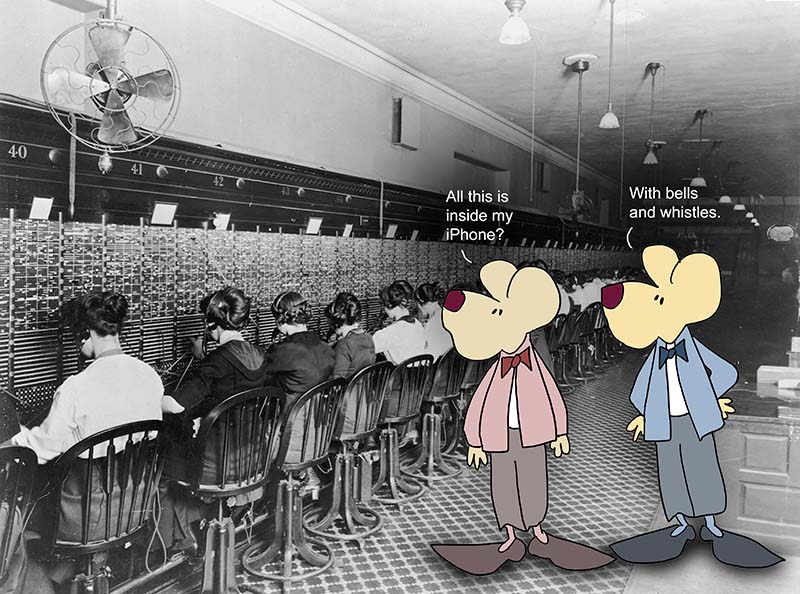We humans communicate. It is what we do. In the early days, a person had to be standing directly in front of another person if they wanted to speak. That good old saying “you had to be there” truly was a requirement for speaking. That held true, voice to voice until the invention of the telephone.
In those earliest days of the telephone, people couldn’t dial one another directly, as we do now. Back then, they need someone in between. A telephone operator.
The idea popped up in April 1877, when 40-year-old George W. Coy attended a lecture by Alexander Graham Bell. This man Coy worked in the telegraph business, and he soon made a deal with Bell.
They would set up the first telephone exchange in the United States — a central switchboard allowing anyone with a telephone to call or be called by anyone else who had a phone. Yowza. Now that’s some wiring.
Coy’s telephone exchange, in New Haven, Connecticut, opened in 1878, with all of 21 clients, “including the local police, post office, and a drug store.” He hired two boys to operate the thing.
Here’s the thing with boys. We all know they are made of snips, and snails, and puppy dog tails. And. They don’t make very good switchboard operators.
The boys Coy hired couldn’t seem to behave themselves. They had a tendency to roughhouse. They would leave callers waiting, and this was not a good way to keep subscribers happy.
So they moved their attention to placing girls on the job. Hence all the hubbub here. This is the anniversary marking the day when Bell hired Emma Nutt on September 1, 1878, in Boston — the first female telephone operator. It was a pretty tall order, really. They had to be patient and polite, not to mention standing ten hours a day on the job. Oh, but the money. The pay was $10 a month. And good old Emma Nutt kept her job for 30 years.
As mentioned, phones could be connected to one another by wire, allowing their two owners to speak. Here’s how it worked.
Every phone in a particular place, town, burb would be connected by wire to a central exchange. So, say Martha wants to talk to Betty about meatloaf. Martha would call the exchange, and a switchboard operator would answer. Martha would give the operator the name of the person he or she wanted to speak with — “Betty, please. I need to know how much ketchup goes in.” Then, the operator would plug a patch cord into that Betty’s socket on the switchboard, connecting the two. Viola’! Then Betty would say, “One quarter cup ketchup. And not a drop more.”
Truthfully, the life of the early telephone operators was just short of torture. Some worked at small, rural exchanges, like in the local railroad station or the back of a general store. In cities, there would be massive switchboards with long rows of operators packed elbow to elbow.
At the busier boards, work could be frantic. Some operators wore roller skates to get around. The dress code was strict. They generally had to wear long black dresses and no jewelry. A list of strict rules applied for the operators, and spies sometimes monitored their calls on a device called a listening board. CIA Operators.
This, from the History Network:
== In 1899, when a 25-year-old San Francisco operator named Anna Byrne killed herself, the coroner held the phone company responsible: “I firmly believe that the espionage to which telephone girls are constantly subjected drives them to suicidal desperation. They are overworked; and no mercy is shown them when a slight offense is committed by a trivial infraction of the company’s rules.”
Many operators agreed. “The wonder is that more telephone girls don’t kill themselves,” a veteran operator told the San Francisco Examiner. “We are not allowed to speak even in a whisper to each other the nine hours we are on duty, much less smile, and to laugh out loud is the height of recklessness.” She said she’d once been forced to work 10 extra hours, without pay, for one brief giggle. ==
So here is to Emma Nutt, the first on the job. A job that turned out to be nuts. Maybe those little boys were smarter than we think.
===========
“Think before you speak. Read before you think.”
― Fran Lebowitz
===========
“Sometimes not speaking says more than all the words in the world.”
― Colleen Hoover
===========
“Men of few words are the best men.”
― William Shakespeare, Henry V
==========
Please hold.
